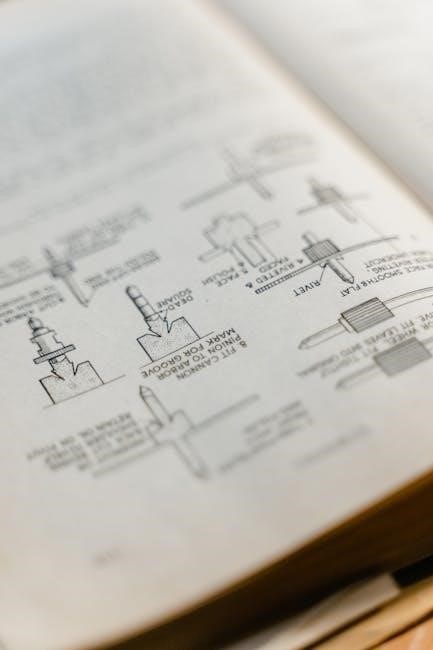catholic teaching on manual stimulation

Catholic teaching on manual stimulation is nuanced‚ often discussed within the broader context of marital sexuality. The Church emphasizes that sexual acts should be both unitive and procreative. Manual stimulation is considered in light of these purposes‚ particularly its role in foreplay within marriage or as an isolated act.
General Overview of Catholic Sexual Ethics
Catholic sexual ethics are rooted in the belief that human sexuality is a gift from God‚ intended for the expression of love and the procreation of life within the context of marriage. This perspective is informed by both natural law and divine revelation‚ emphasizing the dignity of the human person and the sacredness of the marital union. The Church teaches that all sexual activity should be oriented towards these dual purposes‚ fostering intimacy between spouses and remaining open to the possibility of new life.

Central to Catholic sexual ethics is the concept of conjugal love‚ which involves a total self-giving of husband and wife to each other. This love is expressed through acts of marital intimacy‚ which are considered morally good when they reflect the unitive and procreative dimensions of marriage. The Church recognizes the importance of pleasure and affection within the marital relationship‚ but it also cautions against separating these aspects from their natural connection to procreation.
Furthermore‚ Catholic teaching emphasizes the importance of chastity‚ which is understood as the virtue that governs and directs the sexual appetite according to right reason and faith. Chastity is not simply abstinence; rather‚ it involves integrating sexuality into one’s whole person‚ ordering desires towards authentic love and responsible living.
The Purpose of Marital Sex: Unitive and Procreative
Catholic teaching emphasizes that marital sex has two inseparable purposes: the unitive and the procreative; The unitive aspect refers to the bonding and strengthening of the marital relationship through the expression of love and intimacy. This involves a mutual self-giving between husband and wife‚ fostering a deeper connection and commitment.
The procreative aspect acknowledges the potential for new life to arise from the marital act. The Church believes that married couples should be open to the possibility of children‚ recognizing that procreation is a natural and essential part of marriage. These two purposes are intrinsically linked; neither should be deliberately excluded from the marital act.
The Church teaches that every act of marital intimacy should be open to the possibility of procreation‚ even if pregnancy does not always result. This openness does not require couples to have as many children as possible‚ but it does mean that they should not intentionally impede the procreative potential of the marital act through contraception or sterilization.
Furthermore‚ the unitive and procreative purposes of marital sex are not merely physical; they also encompass the emotional‚ spiritual‚ and intellectual dimensions of the marital relationship. The marital act is a profound expression of love and commitment‚ symbolizing the total gift of self between husband and wife.
Masturbation: Definition and Moral Evaluation

In Catholic teaching‚ masturbation is defined as the deliberate stimulation of the genital organs to derive sexual pleasure. This act is considered intrinsically and gravely disordered because it isolates the sexual act from its unitive and procreative purposes within marriage. The Catechism of the Catholic Church firmly maintains this stance‚ reflecting a constant tradition and the moral sense of the faithful.
The Church views masturbation as an act that is essentially self-seeking‚ as it seeks sexual gratification outside the context of a loving‚ committed relationship open to procreation. It is seen as a misuse of the sexual faculty‚ which is intended to be a gift of self within the marital bond.
The gravity of the sin of masturbation is evaluated based on the deliberate nature of the act and the individual’s understanding of its moral implications. Factors such as psychological maturity and social pressures can influence culpability‚ but the Church consistently affirms that masturbation is objectively wrong.
Furthermore‚ Catholic moral theology emphasizes the importance of chastity‚ which involves integrating sexuality within the context of one’s state in life. For unmarried individuals‚ chastity means abstaining from all sexual activity‚ including masturbation. For married couples‚ chastity means expressing sexuality in accordance with the unitive and procreative purposes of marriage.
Manual Stimulation Outside of Marriage
In Catholic moral teaching‚ manual stimulation outside of marriage is generally considered morally wrong. This assessment stems from the Church’s understanding that all sexual acts should be reserved for the marital relationship‚ where they can properly express the unitive and procreative dimensions of love between husband and wife. Any deliberate use of the sexual faculties outside of this context is viewed as disordered.
The Church teaches that sex outside of marriage is always gravely immoral‚ representing a serious sin against God. This includes not only sexual intercourse but also any form of sexual activity‚ including manual stimulation‚ that is engaged in for sexual pleasure outside the bonds of matrimony.
The reasoning behind this prohibition is rooted in the belief that sexual activity is intended to be an expression of love and commitment within marriage‚ and that it should also be open to the possibility of procreation. When these elements are absent‚ as in the case of manual stimulation outside of marriage‚ the act is considered to be a misuse of the sexual faculty.

Furthermore‚ engaging in manual stimulation outside of marriage can lead to a detachment of the sexual act from its proper context‚ potentially fostering a distorted view of sexuality and hindering the development of healthy relationships.
Manual Stimulation within Marriage as Foreplay
The Catholic Church’s perspective on manual stimulation within marriage‚ particularly as foreplay‚ is a topic of ongoing discussion and varying interpretations. While the Church maintains that each sexual act should be both unitive and procreative‚ the role of foreplay in preparing for marital intercourse is often considered. Manual stimulation‚ in this context‚ may be viewed differently than when it is performed in isolation.
Some interpretations suggest that manual stimulation as foreplay is permissible‚ as long as it is ordered towards and culminates in marital intercourse‚ the act that embodies the unitive and procreative purposes. The intention behind the act is crucial; if the manual stimulation is intended to enhance intimacy and prepare the couple for intercourse‚ it can be seen as contributing to the overall marital act.
However‚ other perspectives within the Church emphasize caution‚ particularly regarding the potential for such acts to become disordered if they are pursued for pleasure alone or if they replace intercourse entirely. It’s important to ensure that foreplay remains a means to an end‚ rather than an end in itself‚ and that it serves to strengthen the marital bond and open the couple to the possibility of procreation.
Manual Stimulation to Orgasm Without Intercourse
The Catholic Church’s teaching on manual stimulation leading to orgasm without intercourse is generally viewed as morally problematic. This stance stems from the Church’s understanding of the purpose of sexual acts within marriage‚ which should be both unitive and procreative. When manual stimulation is used to achieve orgasm outside of the context of marital intercourse‚ it is often seen as separating the unitive and procreative aspects of the sexual act.
This separation is considered a disordered use of the sexual faculty‚ as it prioritizes pleasure independently of the marital bond and openness to procreation. The act is viewed as intrinsically oriented towards procreation and unity‚ and deliberately frustrating this orientation is deemed morally wrong. Some interpretations suggest that such acts resemble masturbation‚ which the Church considers gravely sinful.
However‚ nuanced pastoral considerations might arise in specific circumstances‚ such as medical conditions preventing intercourse or situations where a couple is striving to live according to Church teaching but experiences difficulty. Even in these cases‚ the Church encourages couples to seek guidance from a priest or spiritual director to navigate these challenges while remaining faithful to Church teaching.
The Role of Intent and Circumstance
In Catholic moral theology‚ intent and circumstance play a crucial role in evaluating the morality of any action‚ including those related to manual stimulation; The Catechism of the Catholic Church emphasizes that the morality of human acts depends on the object chosen‚ the end in view (intention)‚ and the circumstances surrounding the action. These three elements constitute the sources of the morality of human acts.
The intent behind the act of manual stimulation is paramount. If the intention is solely to seek sexual pleasure outside the context of a unitive and procreative act within marriage‚ it is generally considered morally wrong. However‚ if the intention is to foster intimacy and prepare for marital intercourse‚ the moral evaluation may differ.

Circumstances also significantly impact the moral assessment. Factors such as the marital status of the individuals involved‚ the presence or absence of consent‚ and any specific medical or psychological conditions can influence the judgment. For instance‚ manual stimulation within the context of marital foreplay‚ intended to enhance the marital act‚ is often viewed differently than solitary manual stimulation or stimulation outside of marriage. Ultimately‚ the interplay of intent and circumstance determines the moral gravity of the act.
Differing Interpretations and Debates
Within the Catholic Church‚ differing interpretations and debates exist regarding the morality of manual stimulation‚ particularly within the context of marriage. Some theologians and individuals hold a more traditional view‚ emphasizing the unitive and procreative purposes of marital sex‚ suggesting that any act of manual stimulation that does not directly lead to intercourse is morally questionable. This perspective often cites traditional moral theology and emphasizes avoiding any deliberate separation of the unitive and procreative aspects.
Conversely‚ other interpretations‚ often influenced by St. John Paul II’s Theology of the Body‚ argue for a more nuanced understanding; They suggest that manual stimulation‚ when used as foreplay to enhance intimacy and prepare for the marital act‚ can be morally permissible. This view emphasizes the importance of mutual consent‚ love‚ and the overall context of the marital relationship.
These differing interpretations lead to ongoing debates within the Catholic community‚ with discussions often revolving around the precise definition of the marital act‚ the role of pleasure in marital relations‚ and the application of traditional moral principles to contemporary situations. These debates highlight the complexity of the issue and the need for careful discernment.
Guidance and Resources for Catholics
For Catholics seeking guidance on the topic of manual stimulation‚ several resources are available. The Catechism of the Catholic Church provides foundational teachings on sexuality‚ marriage‚ and moral decision-making. Consulting with a trusted priest‚ spiritual director‚ or Catholic therapist can offer personalized guidance tailored to individual circumstances and conscience.
CatholicAnswers.com and other apologetics websites offer explanations of Church teachings and address common questions. Books and articles by theologians and moral philosophers provide in-depth analyses of the relevant principles and debates. Resources focusing on St. John Paul II’s Theology of the Body can offer a deeper understanding of the Church’s vision of human sexuality and its implications for marital intimacy.
It’s crucial to approach these resources with an open mind and a desire to understand the Church’s teachings while also considering one’s own conscience and relationship with God. Prayerful reflection and ongoing dialogue with trusted advisors can help Catholics navigate this complex issue with clarity and peace.
Remember to always seek information from reputable Catholic sources that faithfully represent the Magisterium’s teachings.
Leave a Reply
You must be logged in to post a comment.